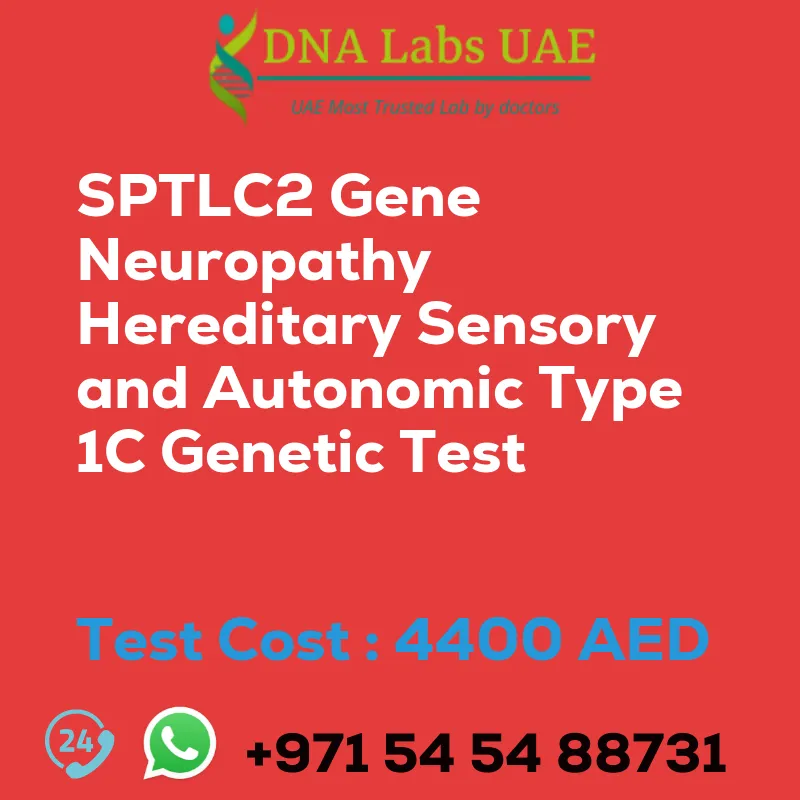
The SPTLC2 Gene Neuropathy Hereditary Sensory and Autonomic Type 1C Genetic Test is a specialized diagnostic examination designed to identify mutations in the SPTLC2 gene, which are linked to the development of Hereditary Sensory and Autonomic Neuropathy Type 1C (HSAN1C). This condition is a rare genetic disorder characterized by a loss of sensory and autonomic functions, leading to symptoms such as insensitivity to pain, temperature, and touch, as well as autonomic dysfunctions.
Conducted at DNA Labs UAE, a leading facility in genetic diagnostics, this test involves analyzing the patient's DNA to detect abnormalities in the SPTLC2 gene that can confirm the diagnosis of HSAN1C. The process is critical for patients exhibiting symptoms of sensory and autonomic neuropathy, as it allows for accurate diagnosis, which is essential for the management and treatment of the condition.
The cost of the SPTLC2 Gene Neuropathy Hereditary Sensory and Autonomic Type 1C Genetic Test at DNA Labs UAE is 4400 AED. This investment in health enables individuals and families affected by this condition to take informed steps towards managing the disorder, potentially improving the quality of life for those diagnosed. Given the complexity and rarity of HSAN1C, accessing precise genetic testing such as this offers a crucial pathway to understanding and addressing this challenging condition.

The SCN9A Gene Neuropathy Hereditary Sensory and Autonomic Type 2 Genetic Test is a specialized diagnostic examination available at DNA Labs UAE, designed to detect mutations in the SCN9A gene. These mutations are associated with Hereditary Sensory and Autonomic Neuropathy Type II (HSAN2), a rare genetic disorder characterized by severe impairment of sensory and autonomic nervous system functions. This condition often leads to a loss of pain and temperature sensation, potentially resulting in unnoticed injuries and serious complications.
The test involves analyzing the patient's DNA to identify any genetic alterations in the SCN9A gene, which plays a critical role in the transmission of sensory and autonomic signals. By pinpointing specific mutations, the test can confirm a diagnosis of HSAN2, allowing for a better understanding of the condition and the development of a tailored management plan.
Offered at a cost of 4400 AED, this genetic test is conducted in the state-of-the-art facilities of DNA Labs UAE, ensuring accuracy and reliability. It is a crucial tool for families with a history of the disorder, individuals presenting symptoms of sensory and autonomic dysfunction, or those seeking a definitive diagnosis for unexplained sensory issues. With this test, patients and healthcare providers can gain valuable insights into the genetic basis of HSAN2, paving the way for targeted interventions and improved quality of life.
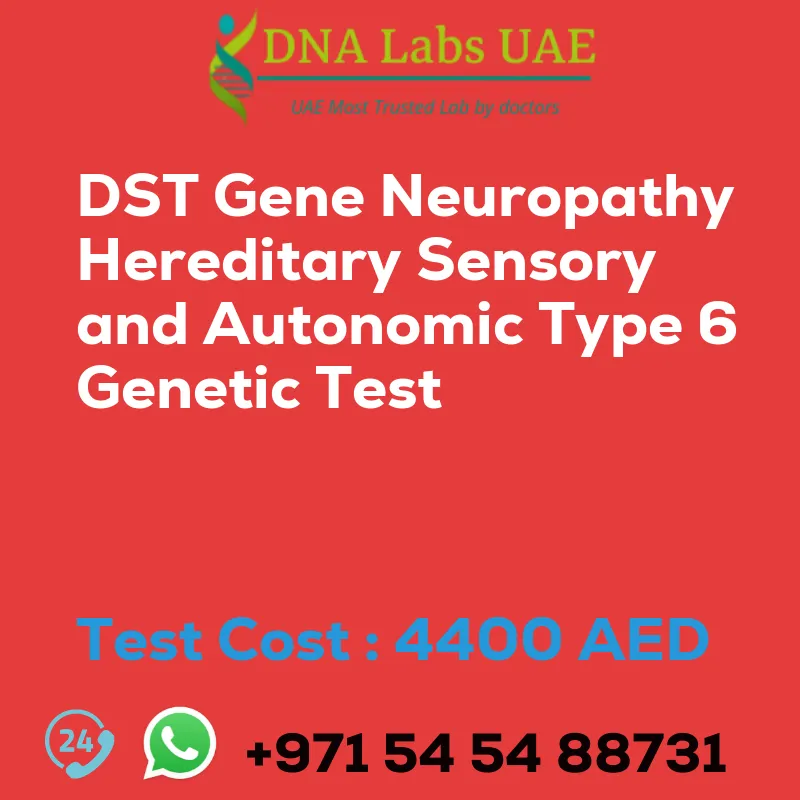
The "DST Gene Neuropathy Hereditary Sensory and Autonomic Type 6 Genetic Test" is a specialized diagnostic procedure available at DNA Labs UAE, designed to identify mutations in the DST gene. These mutations are responsible for causing Hereditary Sensory and Autonomic Neuropathy Type VI (HSAN6), a rare genetic disorder. HSAN6 is characterized by sensory loss, autonomic dysfunction, and, in some cases, skin and bone abnormalities. The test, priced at 4400 AED, involves analyzing the patient's DNA to detect any genetic alterations in the DST gene, providing crucial information for diagnosis, management, and genetic counseling of affected individuals and their families. This test is a valuable tool in the personalized approach to understanding and treating genetic neuropathies.
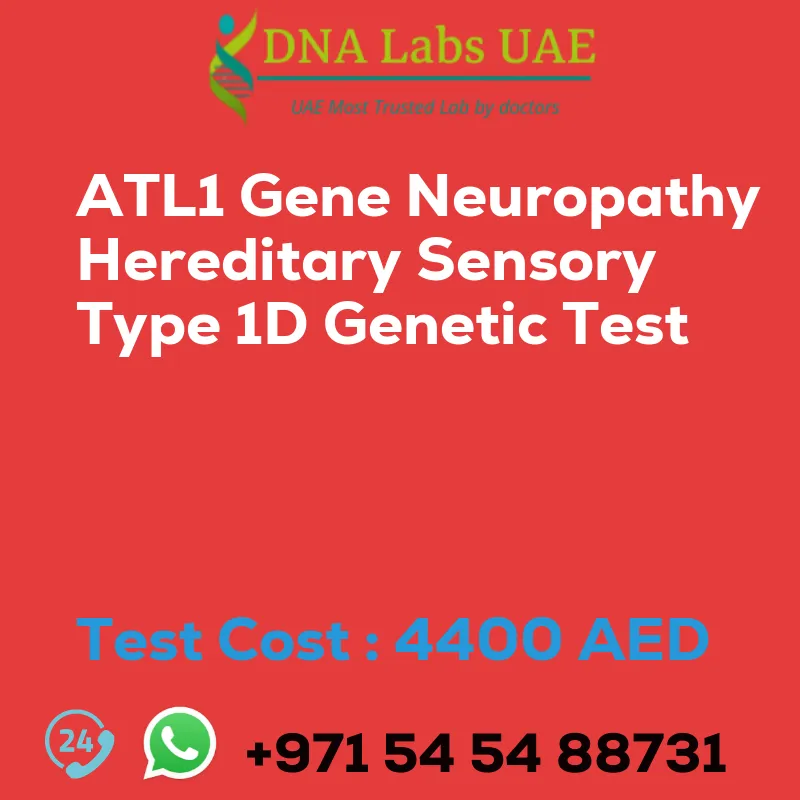
The ATL1 gene neuropathy hereditary sensory type 1D genetic test is a specialized diagnostic tool designed to identify mutations in the ATL1 gene, which are associated with hereditary sensory neuropathy type 1D (HSN1D). HSN1D is a rare genetic disorder characterized by sensory loss in the extremities, leading to significant discomfort, weakness, and in severe cases, amputation due to injury-related complications. This condition is inherited in an autosomal dominant manner, meaning that a mutation in just one of the two copies of the gene is sufficient to cause the disorder.
The test is conducted at DNA Labs UAE, a leading facility in genetic testing and analysis. With a cost of 4400 AED, the test is a critical resource for individuals with a family history of HSN1D or those exhibiting symptoms of sensory neuropathy. Early detection through this genetic test can aid in the management of symptoms and improve the quality of life for affected individuals by implementing preventive measures against complications.
DNA Labs UAE utilizes state-of-the-art technology to ensure accurate and reliable test results, offering crucial insights into the genetic underpinnings of hereditary sensory neuropathy type 1D. This test is an invaluable tool for genetic counselors, neurologists, and patients alike, providing a definitive diagnosis and facilitating informed decisions regarding treatment and management options.
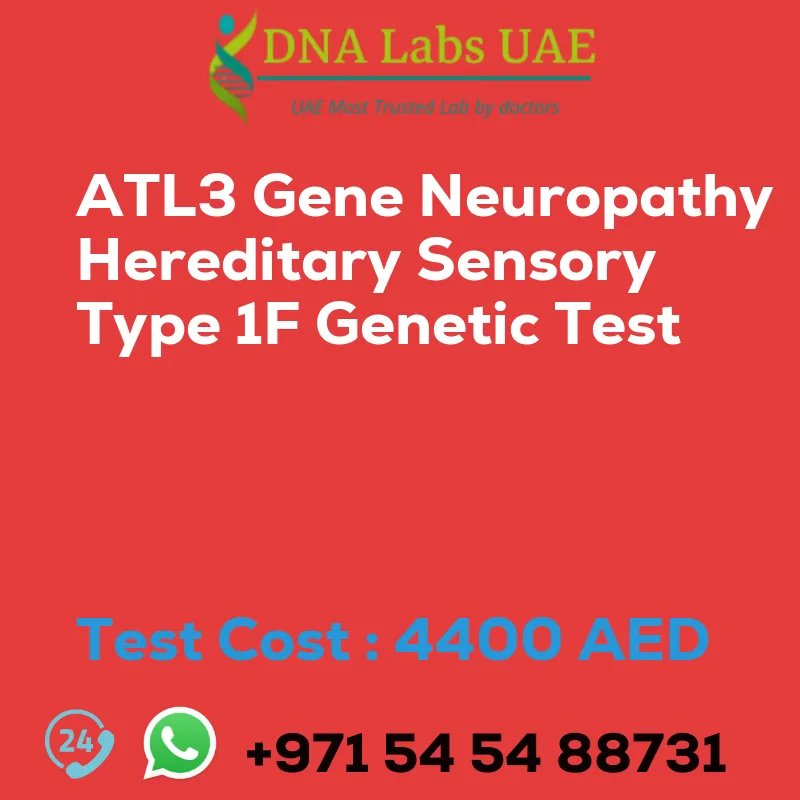
The "ATL3 Gene Neuropathy Hereditary Sensory Type 1F Genetic Test" is a specialized diagnostic tool used to identify mutations in the ATL3 gene, which are associated with Hereditary Sensory Neuropathy Type 1F (HSN1F). HSN1F is a rare genetic disorder characterized by sensory loss in the extremities, leading to pain, weakness, and often injury due to the lack of sensation. The test involves analyzing the patient's DNA to pinpoint any genetic alterations in the ATL3 gene that could cause the condition. Conducted at DNA Labs UAE, a leading facility in genetic diagnostics, the test provides crucial information for the accurate diagnosis and management of HSN1F. The cost of the test is set at 4400 AED, reflecting the comprehensive analysis and expertise required to identify these specific genetic changes. This test is essential for individuals showing symptoms of hereditary sensory neuropathy, as it aids in confirming the diagnosis, understanding the inheritance pattern, and potentially guiding treatment options.
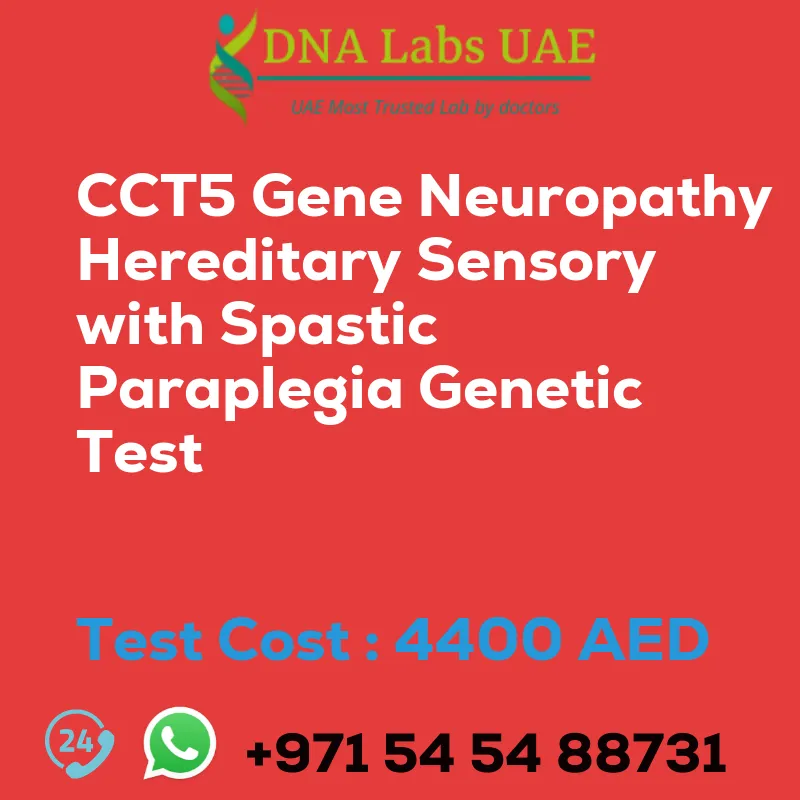
The CCT5 Gene Neuropathy Hereditary Sensory with Spastic Paraplegia Genetic Test is a specialized diagnostic procedure available at DNA Labs UAE, designed to identify mutations in the CCT5 gene. These mutations are known to cause a rare genetic disorder characterized by hereditary sensory neuropathy coupled with spastic paraplegia. This condition affects the nervous system, leading to sensory loss and muscle stiffness, particularly in the lower limbs, significantly impacting mobility and quality of life.
This genetic test is pivotal for early diagnosis and management of the condition, enabling healthcare professionals to tailor treatments and interventions that can alleviate symptoms and improve patient outcomes. Performed with a sample of the patient's DNA, the test scrutinizes the CCT5 gene for specific genetic alterations that are indicative of the disorder.
The cost of the CCT5 Gene Neuropathy Hereditary Sensory with Spastic Paraplegia Genetic Test at DNA Labs UAE is 4400 AED. This investment covers the sophisticated genetic analysis required to detect the presence of CCT5 mutations, offering invaluable insights for affected individuals and their families. Early diagnosis through this test can facilitate timely therapeutic strategies, potentially slowing the progression of symptoms and enhancing the patient's life quality.

The PNPLA2 Gene Neutral Lipid Storage Disease with Myopathy Genetic Test is a specialized diagnostic assessment performed to identify mutations in the PNPLA2 gene, which are responsible for causing Neutral Lipid Storage Disease with Myopathy (NLSDM). This rare genetic disorder is characterized by the accumulation of neutral lipids in the body's cells, leading to a variety of symptoms including muscle weakness, cardiomyopathy, and liver dysfunction. The test is crucial for confirming the diagnosis, understanding the disease's progression, and guiding treatment decisions.
Conducted at DNA Labs UAE, a leading facility in genetic testing, this test offers a comprehensive analysis of the PNPLA2 gene. By examining the specific genetic makeup of an individual, healthcare providers can identify mutations that lead to NLSDM, offering insights into the severity of the condition and potential therapeutic approaches.
The cost of the PNPLA2 Gene Neutral Lipid Storage Disease with Myopathy Genetic Test at DNA Labs UAE is set at 4400 AED. This price reflects the intricate process of genetic analysis, the expertise required to interpret the results accurately, and the significant value it provides in managing the condition effectively. Patients seeking this test can expect a reliable service that employs advanced genetic testing technologies to deliver precise and actionable findings.

The NPC1 gene Niemann-Pick Disease Type C1 genetic test is a diagnostic tool used to detect mutations in the NPC1 gene, which are responsible for Niemann-Pick disease type C1 (NPC1), a rare and potentially fatal genetic disorder. This condition interferes with the body's ability to transport and metabolize cholesterol and other fats, leading to their accumulation in various organs, including the liver, spleen, and brain. Symptoms can include difficulty moving, seizures, and cognitive decline, among others, and can vary widely from person to person.
The test involves analyzing the patient's DNA, extracted from a blood sample, to look for mutations in the NPC1 gene that are known to cause the disease. It is particularly valuable for individuals with a family history of NPC1 or those who exhibit symptoms suggestive of the condition, as early diagnosis can significantly influence management and treatment options.
Performed at DNA Labs UAE, a reputable facility known for its advanced genetic testing services, the NPC1 gene test is priced at 4400 AED. DNA Labs UAE employs state-of-the-art technology and highly skilled professionals to ensure accurate and reliable test results, providing crucial information for the diagnosis, treatment planning, and genetic counseling of affected individuals and their families.

The GTPBP2 gene plays a significant role in the neurological disorder known as Neurodegeneration with Brain Iron Accumulation (NBIA). NBIA is characterized by the accumulation of iron in the brain, particularly in the basal ganglia, leading to a range of movement disorders and neurodegenerative symptoms. Mutations in the GTPBP2 gene have been identified as one of the genetic causes behind certain forms of this disorder. These mutations can disrupt normal cellular functions, leading to the progressive degeneration of nervous tissue and the hallmark iron accumulation.
To diagnose and understand the specific genetic underpinnings of NBIA in patients suspected of having GTPBP2-related neurodegeneration, genetic testing is essential. DNA Labs UAE offers a comprehensive genetic test targeting the GTPBP2 gene to identify mutations that may be responsible for the condition. The test is crucial for accurate diagnosis, which can guide treatment decisions and genetic counseling.
The cost of the GTPBP2-related genetic test at DNA Labs UAE is 4400 AED. This investment covers the meticulous process of DNA analysis to detect the presence of mutations in the GTPBP2 gene. By opting for this test, patients and their families can gain valuable insights into the genetic basis of their condition, opening the door to targeted therapies and interventions that can improve quality of life and manage symptoms more effectively.

The BRAT1 Gene Neurodevelopmental Disorder with Cerebellar Atrophy and with or Without Seizures Genetic Test is a specialized diagnostic procedure offered at DNA Labs UAE. This test is designed to identify mutations in the BRAT1 gene, which have been associated with a rare neurodevelopmental disorder. This condition is characterized by cerebellar atrophy, which can lead to significant developmental delays, motor skill impairments, and in some cases, seizures. The genetic test aims to provide conclusive evidence of the presence of BRAT1 mutations, facilitating early diagnosis and enabling tailored management strategies for affected individuals. The cost of the test is 4400 AED, reflecting the advanced technology and expertise required to accurately detect and interpret BRAT1 gene mutations. By opting for this test, families and healthcare providers can gain crucial insights into the genetic underpinnings of this neurodevelopmental disorder, paving the way for better-informed treatment and support decisions.














